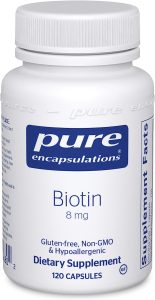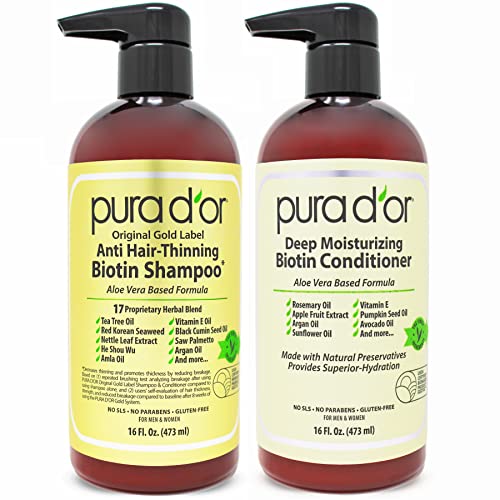Biotin
What is Biotin?
Vitamin H or biotin, is an essential nutrient for maintaining healthy hair, skin and nails. Incorporate it in your daily diet for optimal results!?♂️#vitaminH #biotin #haircare #skincare #nailcare #diet #nutrition #healthyliving #wellness #beauty #essentialnutrients
Biotin is a water-soluble vitamin that is essential for the metabolism of fats, carbohydrates, and proteins. It is a cofactor for several enzymes involved in these processes, including acetyl-CoA carboxylase, which is involved in the synthesis of fatty acids, and pyruvate carboxylase, which is involved in the breakdown of carbohydrates. Biotin is also necessary for the metabolism of amino acids, which are the building blocks of proteins.
Biotin’s role in the body
Biotin is involved in a number of important metabolic processes in the body. In addition to its role in the metabolism of fats, carbohydrates, and proteins, biotin is also involved in the synthesis of several key biomolecules, including nucleic acids (DNA and RNA) and hormones.
Biotin is necessary for the proper function of several enzymes, including acetyl-CoA carboxylase, pyruvate carboxylase, and propionyl-CoA carboxylase. These enzymes are involved in the synthesis and breakdown of various biomolecules, including fatty acids, cholesterol, and amino acids.
Acetyl-CoA carboxylase is an enzyme that is involved in the synthesis of fatty acids. It converts acetyl-CoA, a molecule produced during the breakdown of fats, carbohydrates, and proteins, into malonyl-CoA, which is then used in the synthesis of fatty acids.


Pyruvate carboxylase is an enzyme that is involved in the breakdown of carbohydrates. It converts pyruvate, a molecule produced during the breakdown of glucose, into oxaloacetate, which can then be used in the citric acid cycle to produce energy.
Propionyl-CoA carboxylase is an enzyme that is involved in the metabolism of amino acids. It converts propionyl-CoA, a molecule produced during the breakdown of certain amino acids, into succinyl-CoA, which can then be used in the citric acid cycle to produce energy.
Biotin is also involved in the metabolism of several amino acids, including leucine, isoleucine, and valine. These amino acids are essential for the synthesis of proteins and other biomolecules, and they are important for the proper functioning of the immune system, muscle tissue, and other organs and tissues.
In addition to its role in metabolism, biotin is also important for maintaining healthy skin, hair, and nails. It is believed to help strengthen hair and nails and to improve the condition of the scalp.
Biotin is often used as a dietary supplement for these purposes, although the effectiveness of biotin for these purposes is not well established.


Biotin in foods
Biotin is found in a wide variety of foods, including eggs, nuts, seeds, and certain types of vegetables. Good sources of biotin include almonds, peanuts, avocados, sweet potatoes, and spinach.
Biotin is also produced by the bacteria that live in the human gut, and it is synthesized by some plants, such as yeast.
Biotin deficiency is rare, but it can occur in people with conditions that interfere with the absorption of nutrients, such as Crohn’s disease or alcoholism. Symptoms of biotin deficiency may include hair loss, dry skin, and brittle nails. In severe cases, biotin deficiency can lead to a condition called seborrheic dermatitis, which causes red, scaly skin on the face, scalp, and chest.

Biotin supplements
Biotin supplements are often marketed as a treatment for hair loss and other conditions, such as brittle nails and seborrheic dermatitis. However, there is limited scientific evidence to support these claims. While biotin may be beneficial for people with biotin deficiency, it is not clear whether it has any additional benefits for people who are already getting enough biotin from their diet.
There is also some concern that high doses of biotin may interfere with the accuracy of certain medical tests, such as those used to diagnose diabetes or thyroid disease. It is important to speak with a healthcare provider before taking biotin or any other dietary supplement, as supplements can interact with medications and may have side effects.


In conclusion
Biotin is a type of vitamin that is necessary for the proper functioning of the human body. It plays a crucial role in the process of metabolism, which is the way the body converts food into energy, and it is also involved in the synthesis of various biomolecules, which are substances that are essential for the structure and function of cells and tissues. Biotin can be found in a wide range of foods, including eggs, nuts, and certain vegetables, and it is also available as a dietary supplement in the form of pills, capsules, or powders.
While biotin supplements may be helpful for people who are not getting enough biotin from their diet, the benefits of biotin for individuals who are already obtaining adequate amounts of biotin from their diet are unclear. In fact, some studies have suggested that taking high doses of biotin may interfere with the accuracy of certain medical tests, such as those used to measure levels of hormones or enzymes in the blood. Therefore, it is important to consult with a healthcare provider before taking biotin or any other dietary supplement, particularly if you are pregnant, nursing, or have a medical condition.
Biotin
Pure Encapsulations Biotin 8mg
Nourishing my hair, skin and nails with Pure Encapsulations Biotin 8mg! ??♀️ #HealthyBeauty #BiotinBoost #PureEncapsulations #VitalNutrition

What is Pure Encapsulations Biotin 8mg?

Pure Encapsulations Biotin 8 mg
Pure Encapsulations Biotin is a dietary supplement that provides biotin, a B-vitamin also known as vitamin H. Biotin is important for healthy skin, hair, and nails, and it also supports carbohydrate, protein, and fat metabolism. Biotin is commonly found in foods such as eggs, nuts, and leafy green vegetables, but some people may still benefit from taking a biotin supplement like Pure Encapsulations Biotin.
Pure Encapsulations Biotin is a pure and potent form of biotin that is free from potential allergens and artificial additives. It is also made with hypoallergenic ingredients, making it suitable for individuals with sensitivities. The biotin in Pure Encapsulations Biotin is in a crystalline form, which provides for better stability and absorption.
It is recommended to take one capsule daily, or as directed by a healthcare professional. As with any supplement, it is important to talk to your doctor before starting to take Pure Encapsulations Biotin, especially if you have a medical condition or are taking any medications.
Pure Encapsulations Biotin is a high-quality dietary supplement that provides a concentrated source of biotin, a B-vitamin that is essential for several important bodily functions. Biotin, also known as vitamin H, is a water-soluble vitamin that is involved in a wide range of metabolic processes, including the metabolism of carbohydrates, fats, and proteins. This nutrient is also important for healthy skin, hair, and nail growth, and it plays a role in the production of neurotransmitters, which are chemicals that transmit signals in the brain. By supplementing with Pure Encapsulations Biotin, individuals can help ensure they are getting an adequate intake of this important nutrient and may be able to experience some of its potential benefits.
Some of the potential benefits of taking biotin supplements include:
- Supports Healthy Skin, Hair, and Nails: Biotin is known to be important for the maintenance of healthy skin, hair, and nails. This vitamin is involved in the formation of keratin, a protein that is a key component of these structures. Biotin supplementation may help improve the health and appearance of the skin, hair, and nails by supporting the formation of strong, flexible, and resilient keratin.
- Supports Energy Metabolism: Biotin is involved in the metabolism of carbohydrates, fats, and proteins and helps the body convert food into energy. By supporting energy metabolism, biotin supplementation may help improve overall energy levels and reduce fatigue.
- Promotes Nerve Function: Biotin is also involved in the production of neurotransmitters, which are chemicals that transmit signals in the brain. By promoting nerve function, biotin supplementation may help improve cognitive function and reduce the risk of neurodegenerative disorders.
- Supports Cardiovascular Health: Biotin has been shown to help regulate blood sugar levels and improve artery function, which may help reduce the risk of cardiovascular disease. Additionally, biotin supplementation may help lower total cholesterol levels and improve cholesterol ratios.
- Supports Healthy Pregnancy: Biotin is important for fetal growth and development and can help prevent birth defects. Pregnant women who are deficient in biotin may benefit from biotin supplementation to ensure they and their developing fetus are getting an adequate intake of this essential nutrient.

Pure Encapsulations Biotin 8 mg | B Vitamin Supplement for Stress Relief, Hair, Skin, and Nail Strengthening, Metabolism, Carbohydrate Support, and Nervous System* | 120 Capsules
In summary
Pure Encapsulations Biotin is a dietary supplement that provides biotin to support healthy skin, hair, nails, and metabolism. It is a pure and hypoallergenic form of biotin that is recommended to be taken once daily, or as directed by a healthcare professional.
It’s important to note that biotin supplementation should always be done under the supervision of a healthcare professional, as taking too much biotin can interfere with certain laboratory tests and lead to false results. Additionally, it’s always best to strive to get nutrients from a balanced diet whenever possible, and supplementation should be used to supplement, not replace, a healthy diet.
Biotin
3 Best Gummies for Hair Growth
Give your hair the boost it needs with hair growth gummies!#hairtreatment #hairvitamins #gummies #nourishhair #growhairfast #hairsupplement #healthyhair

What are hair growth gummies?
Hair growth gummies are a type of dietary supplement that is claimed to promote healthy hair growth. They typically contain a variety of nutrients such as vitamins, minerals, and amino acids that are essential for healthy hair. Some of the potential benefits of taking hair growth gummies may include:
- Improved hair strength: Hair growth gummies may help to strengthen hair strands and reduce breakage, leading to longer, healthier-looking hair.
- Increased hair density: These supplements may help to stimulate hair growth and increase the density of your hair.
- Nourished hair: Hair growth gummies may contain nutrients that help to nourish the hair and scalp, which may lead to healthier-looking hair.
- Convenience: Gummies are an easy and convenient way to get your daily dose of hair-healthy nutrients, as they are easy to take on the go and do not require water to swallow.
3 Best gummies for hair growth
There are several gummy brands that claim to help with hair growth on the market. but these is 3 best gummies for hair growth:
SugarBear Hair vitamins

Sugarbear Vegan Hair Gummy Vitamins
Contain a blend of vitamins and nutrients that are claimed to be beneficial for hair health, including biotin, folic acid, and Vitamin D. Biotin is a B-vitamin that is necessary for the production of keratin, a protein that is a key component of hair, skin, and nails. Folic acid is a B vitamin that plays a role in the production of red blood cells, which transport oxygen and nutrients to the cells in the body, including those in the scalp. Vitamin D is a nutrient that helps the body absorb calcium, which is necessary for strong hair and nails.
In addition to these nutrients, SugarBear Hair gummies also contain other ingredients such as blueberry and raspberry flavors, as well as natural colors and sweeteners. Some people may experience benefits such as stronger and thicker hair, improved hair growth, and reduced hair loss when taking these gummies as directed.
The recommended serving size is two gummies per day, and the product is intended for adults only. It is not recommended for children under the age of 13. Some people have reported positive results after taking SugarBear Hair gummies, but it is important to note that individual results may vary.
The exact list of ingredients may vary slightly depending on the specific formula, but some of the common ingredients found in these gummies include:
- Biotin: Biotin is a B-complex vitamin that is essential for the metabolism of proteins, fats, and carbohydrates. It is also important for the health of the hair, skin, and nails.
- Folic acid: Folic acid is a B-complex vitamin that is important for the production of red blood cells and the metabolism of proteins.
- Vitamin D: Vitamin D is a fat-soluble vitamin that is essential for the absorption of calcium and phosphorous, which are both important for the health of the bones and teeth.
- Vitamin E: Vitamin E is an antioxidant that helps to protect the cells in the body from free radical damage.
- Vitamin A: Vitamin A is a fat-soluble vitamin that is important for the health of the eyes and the immune system.
- Vitamin C: Vitamin C is an antioxidant that helps to protect the cells in the body from free radical damage. It is also important for the production of collagen, which is a protein that helps to support the structure of the skin and hair.
- Vitamin B-6: Vitamin B-6 is a B-complex vitamin that is important for the metabolism of proteins, carbohydrates, and fats.
- Vitamin B-12: Vitamin B-12 is a B-complex vitamin that is important for the production of red blood cells and the metabolism of proteins.
Hum Sweet Hair Gummies

HUM Hair Sweet Hair
Is a dietary supplement in the form of a gummy candy that is marketed as a hair growth and hair health support product. According to the manufacturer, the gummies contain a blend of vitamins, minerals, and other nutrients that are intended to support the health of hair, skin, and nails. Some of the ingredients included in the product are biotin, folic acid, and vitamin C. It is suggested that the gummies be taken twice daily for best results.
Here is a list of some of the key ingredients in Hum Nutrition Sweet Hair Gummies and their potential benefits for hair health:
- Biotin: A B-complex vitamin that is essential for the metabolism of fats and amino acids, biotin is often included in hair, skin, and nail supplements because it may help to strengthen hair and improve its appearance.
- Folic acid: Another B-complex vitamin, folic acid is necessary for the production of red blood cells and the metabolism of proteins. It may also be beneficial for hair health, as it is involved in the synthesis of keratin, a protein that is a key component of hair.
- Vitamin C: An antioxidant that is important for the production of collagen, a protein that helps to support the structure of hair and skin. Vitamin C may also help to protect hair from damage caused by free radicals.
- Vitamin E: Another antioxidant that is believed to help protect hair from damage and improve its overall health and appearance.
- Zinc: A mineral that is necessary for the proper functioning of the hair follicles and the production of sebum, an oil that helps to keep hair healthy and moisturized.
Revita Hair Growth Gummies

Revita Hair Growth Gummies
Is a dietary supplement that claims to promote healthy hair growth. According to the manufacturer, these gummies contain ingredients like biotin, folic acid, and collagen, which may help support healthy hair, skin, and nails. It is important to note that while these ingredients may have some benefits for hair health
Here is some additional information about the ingredients in Revita Hair Gummies and their potential effects on hair health:
- Biotin: Biotin is a B vitamin that is essential for the metabolism of fats, carbohydrates, and proteins. It is often included in hair and nail supplements because it may help strengthen hair and nails. However, there is limited scientific evidence to support its effectiveness in improving hair growth.
- Folic acid: Folic acid is another B vitamin that is important for cell growth and the synthesis of DNA. It is sometimes included in hair supplements because it may help improve hair health and prevent hair loss. However, the evidence for its effectiveness is mixed and more research is needed.
- Collagen: Collagen is a protein that is found in the skin, hair, and nails. It is sometimes included in hair supplements because it may help improve hair strength and prevent breakage. However, it is unclear if taking collagen supplements orally has any effect on the hair or nails.
It’s important to note that the effectiveness of these ingredients for hair health may vary depending on the individual, and more research is needed to fully understand their potential benefits. As with any dietary supplement, it is always best to speak with a healthcare professional before adding it to your routine.
Biotin
What are some Biotin Shampoo side effects?
Side effects you need to before using biotin shampoos!#biotinshampoo #haircare #hairloss #hairgrowth #hairtreatment #haircaretipssideeffects #haircareroutine

Biotin shampoos are often advertised as a solution for hair loss, but there is no scientific evidence to support this claim. However, biotin shampoos may have other benefits for hair, such as strengthening and protecting it from damage, encouraging the growth of existing hair, reducing inflammation in the scalp, and helping to mend split ends and eliminate breakage. Some biotin shampoos may also contain DHT blockers, which are hormones that may help to slow down or prevent hair loss, but their effectiveness when applied topically in a shampoo is uncertain.
What is Biotin?
Biotin is a water-soluble B vitamin that is essential for the production of keratin, a protein that is a major component of the hair, skin, and nails. Biotin is found naturally in a variety of foods, including eggs, nuts, and leafy green vegetables, and it is also available as a dietary supplement. Biotin shampoos contain biotin as an active ingredient, and they are often marketed as products that can help to strengthen and nourish the hair.
There is some scientific evidence to suggest that biotin may be beneficial for hair health. Biotin is involved in the production of keratin, a protein that is a major component of the hair, skin, and nails. Some studies have found that biotin supplements may improve hair thickness and decrease hair loss in people with biotin deficiency. However, more research is needed to confirm these findings and to determine the optimal dosage and duration of treatment.
Several studies have found that biotin supplements may improve hair thickness and decrease hair loss in people with biotin deficiency. For example, a study published in the Journal of Clinical and Aesthetic Dermatology found that a daily dose of 2.5 mg of biotin for 90 days significantly increased hair thickness in women with thinning hair. Another study published in the journal Dermatology and Therapy found that biotin supplementation improved hair growth and reduced hair loss in people with alopecia areata, an autoimmune disorder that causes hair loss.
However, it’s important to note that these studies have used biotin supplements rather than biotin shampoos, and more research is needed to determine the effectiveness of biotin shampoos specifically. Additionally, the optimal dosage and duration of treatment with biotin supplements or biotin shampoos is not yet fully understood, and further research is needed to determine the most effective dosage and treatment regimen.
What Can Biotin Shampoo Actually Do?
- Strengthen and protect the hair from damage: Biotin can help to nourish and strengthen the hair, making it more resistant to damage from styling and environmental factors.
- Encourage the growth of existing hair: Biotin can help to promote healthy hair growth by providing essential nutrients to the hair follicles.
- Reduce inflammation in the scalp: Inflammation in the scalp can inhibit hair growth and lead to hair loss. Biotin may be able to reduce inflammation and improve the health of the scalp, which can be beneficial for the hair follicles.
- Mend split ends and eliminate breakage: Biotin can help to repair damaged hair and prevent breakage, which can help to maintain the length and health of your hair.
- Clear away flakes blocking the hair follicles: Dandruff and other scalp conditions can cause flakes that can block the hair follicles and inhibit hair growth. Biotin may be able to help clear away these flakes and improve the health of the scalp.
Biotin on its own can’t do anything to help your hair loss but combined with other hair nourishing ingredients it can improve the quality of your existing hair and create an optimal environment for hair growth, no promises for it to help regrowth though.
Some shampoos are even formulated with DHT blockers (DHT is a hormone that has been linked to excessive hair loss) and are thought to be able to slow down or stop hair loss.
Medical professionals are familiar with the effectiveness of DHT Blockers in the form of oral medication, and just like biotin, they only recommend oral medication if necessary.
Topical products like shampoos may seem like an easier and safer option, however, ingredients in wash-off products often don’t yield the results that they promise because of the fact that they are washed away.
There are some ingredients that may stay on the skin after rinsing if it has sufficient contact with the skin; try leaving the shampoo on your scalp/ hair for 2-3 minutes before rinsing to get the most out of the product.




Are there side effects to using Biotin Shampoos?
Biotin shampoos are generally considered to be safe and well-tolerated, and side effects are rare. However, as with any product, there is a possibility of experiencing side effects when using a biotin shampoo. Some possible side effects of biotin shampoos include dryness, allergic reactions, changes in hair texture, and changes in hair color.
- Dryness: Biotin shampoos may cause dryness of the scalp and hair if they are overused or if they are used too frequently. To avoid this, it’s important to follow the instructions for use on the product label and to only use the product as directed. Using a conditioner after shampooing can also help to moisturize the hair and scalp and prevent dryness.
- Allergic reactions: Some people may be allergic to biotin or to ingredients in biotin shampoos, which can cause symptoms such as itching, redness, and rash. If you experience any allergic reactions after using a biotin shampoo, stop using the product immediately and consult a healthcare professional.
- Changes in hair texture: Biotin shampoos may change the texture of the hair, making it feel thicker or softer. This is usually a temporary effect and should resolve on its own within a few days.
- Changes in hair color: Biotin shampoos may cause the hair to become lighter or darker in color. This is usually a temporary effect and should resolve on its own within a few days.
It’s important to note that biotin shampoos are not a cure-all for hair loss or other hair problems. While they may help to improve the health of the hair and scalp, they are not a substitute for proper hair care and a healthy diet. A healthy diet that includes a variety of nutrient-rich foods, such as fruits, vegetables, and lean proteins, is essential for maintaining the health of the hair and scalp. In addition, using a mild shampoo, avoiding harsh hair care products, and avoiding heat styling can all help to keep the hair and scalp healthy.
In conclusion
Biotin shampoos may not be able to reverse hair loss or regrow hair, but they can improve the overall quality and health of your hair. It is important to be cautious of unrealistic claims made by beauty products and to speak with a healthcare professional before starting any new supplement or treatment for hair loss.
It’s also important to note that biotin shampoos are not a cure-all for hair loss or other hair problems. While they may help to improve the health of the hair and scalp, they are not a substitute for proper hair care and a healthy diet.
If you have concerns about your hair or scalp, it’s always best to consult a dermatologist or other healthcare professional. They can evaluate your individual needs and recommend the best course of treatment based on your specific concerns and medical history.




